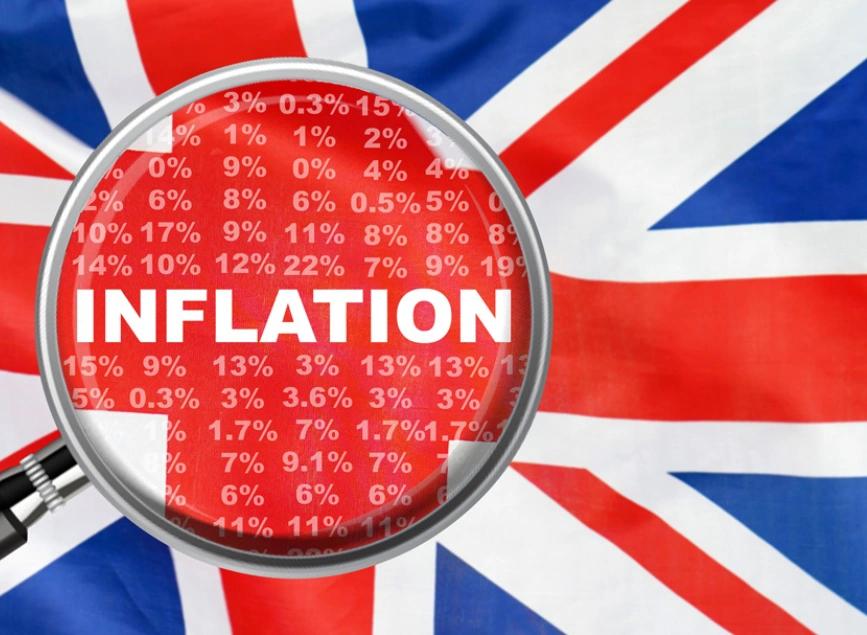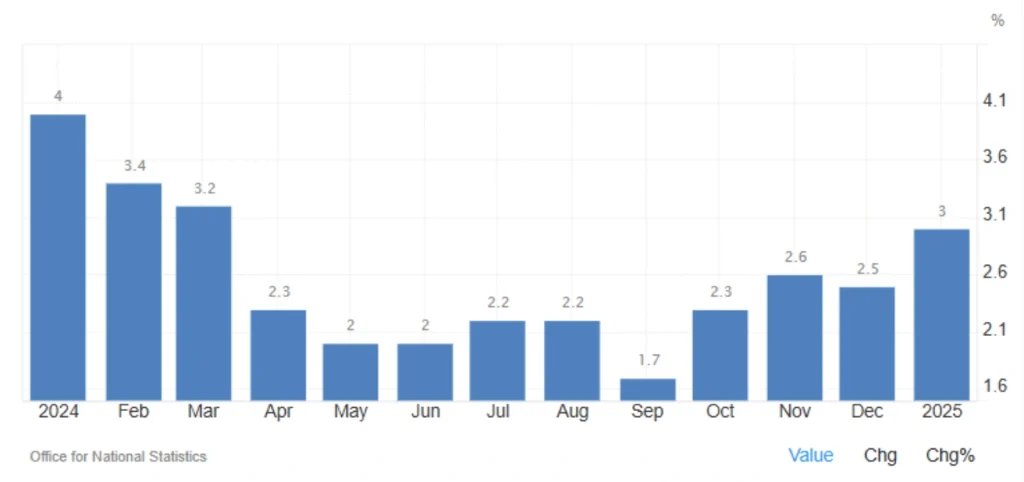
UK Inflation Surges to 3% in January 2025
The UK’s inflation rate climbed to 3% in January 2025, marking its highest level since March 2024. This rise exceeded both December’s 2.5% inflation rate and the forecasted 2.8%. But what is driving this increase, and how will it impact everyday life?
What’s Causing Inflation to Rise?
Several key sectors have contributed to the higher inflation rate, with some experiencing sharp price increases.
Transportation Costs on the Rise
The transportation sector saw inflation jump from -0.6% to 1.7%, mainly due to higher airfare and fuel prices. However, a drop in used car prices helped offset some of the impact.
Food and Drink Prices Continue to Climb
Grocery bills are getting heavier as inflation in the food and non-alcoholic beverage sector rose from 2.5% to 3.3%. The main factors behind this increase include higher prices for meat, bread, and cereals.
Recreation and Culture Seeing Price Hikes
From entertainment subscriptions to cultural activities, inflation in this category increased from 3.4% to 3.8%.
Education Costs Surge Due to VAT Increase
One of the most significant increases came in education, where inflation rose from 5% to 7.5%. This spike is largely due to the UK government’s decision to apply a 20% VAT to private school tuition fees.
Services Inflation Edges Up
The services sector saw inflation rise from 4.4% to 5%, though it remained slightly below the Bank of England’s forecast of 5.2%.
Areas Where Inflation Declined
Not all sectors experienced rising prices. Some saw a slight reduction:
- Restaurants and Hotels: A small decrease from 3.4% to 3.3%.
- Housing and Utilities: Inflation fell from 3.1% to 2.1%, offering some relief for homeowners and renters.
Meanwhile, core inflation, which excludes volatile food and energy prices, reached 3.7%, aligning with expectations. The Consumer Price Index (CPI) fell by 0.1% month-on-month, though experts had anticipated a steeper 0.3% decline.
Read More: UK Economy Contracts in October 2024
Why This Inflation Increase Matters
Rising inflation is more than just an economic statistic; it affects policies, businesses, and household finances in significant ways.
Pressure on Monetary Policy
With inflation climbing, the Bank of England may feel compelled to keep interest rates high for longer, making borrowing more expensive.
Household Budgets Under Strain
As prices for essential goods and services rise, purchasing power decreases, making it harder for families to afford everyday expenses.
Government Facing Economic Challenges
Higher costs, particularly in education and transportation, put pressure on the government to introduce policies that ease the financial burden on citizens.

Understanding Inflation: The Bigger Picture
What Is Inflation?
Inflation refers to the steady rise in the general price level of goods and services over time. It is typically measured through the Consumer Price Index (CPI) or core inflation, which excludes food and energy prices.
Key Factors That Drive Inflation
- Increased Consumer Demand: When demand for goods and services rises, prices often follow.
- Higher Production Costs: Rising costs for raw materials, wages, and transportation contribute to inflation.
- Economic Policies: Low interest rates and government spending can also fuel inflation by increasing money circulation.
How Inflation Affects the Economy
Potential Benefits:
- Moderate inflation can promote economic growth and wage increases.
- It helps reduce the real value of government debt.
Challenges and Risks:
- Reduces consumers’ purchasing power, making everyday expenses harder to manage.
- Higher interest rates can discourage borrowing and investment.
- Sharp inflation swings can lead to economic uncertainty.
Final Thoughts
The UK’s inflation rate hitting 3% raises important questions about the future of economic policies, interest rates, and household finances. While some sectors, such as housing and dining, have seen relief, rising costs in transportation, food, and education are putting financial pressure on consumers.
As we move forward, all eyes will be on the Bank of England’s next steps and how government policies evolve to address these economic challenges. Whether you are a business owner, investor, or everyday consumer, staying informed about inflation trends is crucial in navigating the changing financial landscape.
Share
Hot topics

Trading with price action
When they start, most traders will believe that they must discover the ideal indicator for success. At otet markets, we see this every day.They test a variety of indicators, including...
Read more




Submit comment
Your email address will not be published. Required fields are marked *